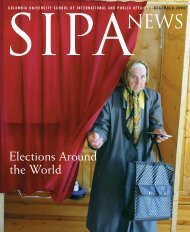Promoting IDPs' and Women's Voices in Post-Conflict Georgia
Promoting IDPs' and Women's Voices in Post-Conflict Georgia
Promoting IDPs' and Women's Voices in Post-Conflict Georgia
- No tags were found...
You also want an ePaper? Increase the reach of your titles
YUMPU automatically turns print PDFs into web optimized ePapers that Google loves.
‣ Address male IDP needs (Immediate Term)In <strong>Georgia</strong>, there are numerous NGOs focus<strong>in</strong>g on women’s issues. However, as many experts highlight,many men may be depressed <strong>and</strong> less active <strong>in</strong> <strong>Georgia</strong>n society. There is a need for more programm<strong>in</strong>gthat targets men’s issues <strong>and</strong> needs. NGOs should reassess <strong>and</strong> change their approach <strong>and</strong> package their<strong>in</strong>itiatives differently to encourage men’s participation, often low <strong>in</strong> their programm<strong>in</strong>g. Gendersensitivity,often understood to address women’s concerns, also needs to address men’s issues. NGOsshould work with the MRA to promote their awareness <strong>and</strong> acceptance of this issue. They should alsotailor their programs to specifically address the psychosocial factors that may particularly <strong>in</strong>fluence men– the fact that often times they are no longer the bread-w<strong>in</strong>ners of the family, their lack of professionalopportunities, <strong>and</strong> the change <strong>in</strong> the social <strong>and</strong> familiar roles these situations entail. Livelihood<strong>in</strong>itiatives <strong>and</strong> vocational tra<strong>in</strong><strong>in</strong>g, along with men’s groups that provide them with the opportunity toconnect with one another <strong>and</strong> discuss issues <strong>in</strong> their own way could serve as some examples ofprogramm<strong>in</strong>g ideas.‣ Reform local representative structures (Immediate to Intermediate Term)Our field research revealed that the community leaders, or mamasakhlis, of each collective center areappo<strong>in</strong>ted by the government, <strong>and</strong> <strong>in</strong> many cases, they serve more as a k<strong>in</strong>d of commissar that controlswhat people th<strong>in</strong>k <strong>and</strong> do, rather than serv<strong>in</strong>g as a true representative of the community. The localrepresentative structure <strong>in</strong> the collective centers should be reformed so that community members canengage <strong>in</strong> the process of select<strong>in</strong>g the mamasakhlis.The ma<strong>in</strong> obstacle <strong>in</strong> this sense is that <strong>Georgia</strong>n legislation forbids hold<strong>in</strong>g elections <strong>in</strong> collective centers,settlements, or any other portion of territory that is not <strong>in</strong>corporated as a municipality. One solutionwould be to reform the law <strong>in</strong> order to take <strong>in</strong>to account the unique case of collective centers <strong>and</strong>settlements. If legal reform to achieve direct elections <strong>in</strong> collective centers is not politically feasible,NGOs can launch community mobilization <strong>in</strong>itiatives as a tool to designate leaders <strong>in</strong> each collectivecenter. These leaders could be <strong>in</strong>formally elected dur<strong>in</strong>g one of the meet<strong>in</strong>gs ––<strong>in</strong>clud<strong>in</strong>g focus groups,tra<strong>in</strong><strong>in</strong>gs <strong>and</strong> workshops–– held <strong>in</strong> every settlement.Once every collective center has a leader who represents the <strong>in</strong>terests of the community, this newstructure of local leaders could help strengthen advocacy <strong>in</strong>itiatives with<strong>in</strong> the centers, channeldem<strong>and</strong>s to the government by work<strong>in</strong>g with the mamasakhlis, <strong>and</strong> also serve as a first resort ofcommunication when the national or local governments consult with IDPs from specific centers.103

















